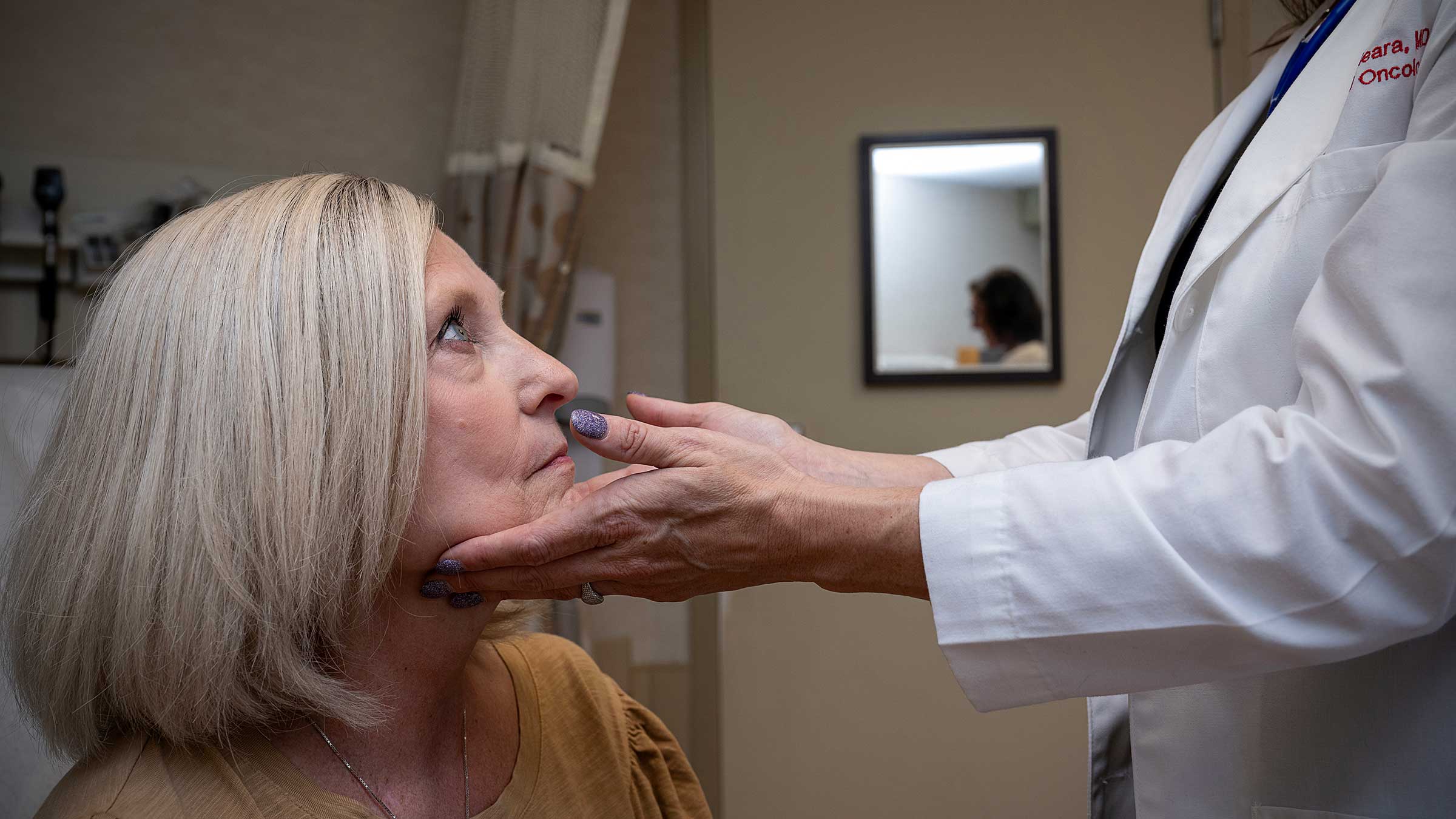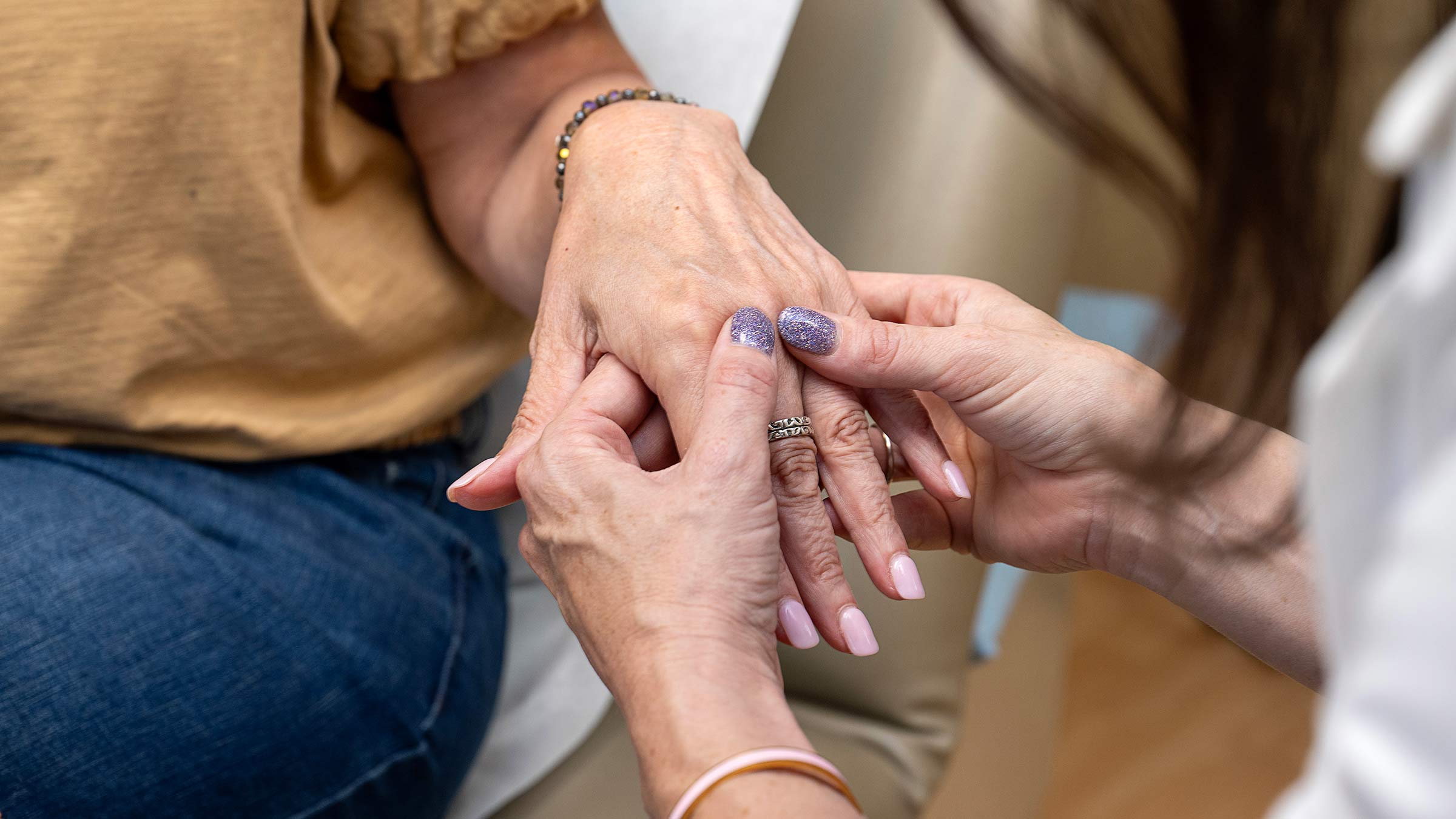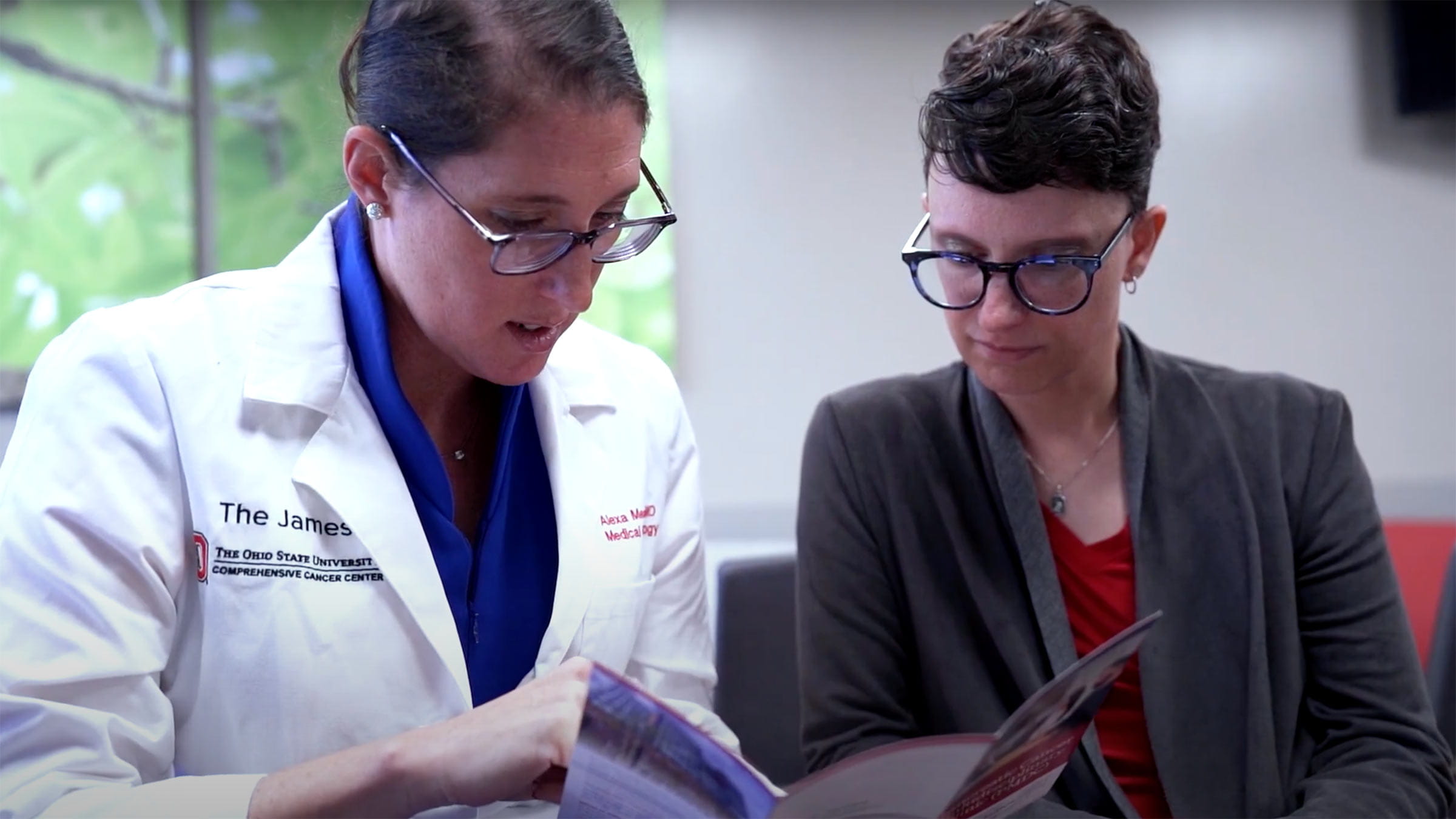Reversing the side effects of immunotherapy cancer treatment
When immunotherapy triggers autoimmune and other side effects, a unique clinic is giving patients relief.
After months of breast cancer treatment, Julie was accustomed to enduring difficult side effects. But knowing her cancer cells were being destroyed was enough to keep her from complaining.
The burning sensation in her mouth was different.
Her mouth felt on fire whenever she ate anything other than the blandest foods. The slightest addition of garlic, onion or black pepper was like inhaling ghost peppers.
When she lost 15 pounds and complained the pain was affecting her quality of life, Julie was referred to the Immunotherapy Management Clinic at The Ohio State University Comprehensive Cancer Center – Arthur G. James Cancer Hospital and Richard J. Solove Research Institute (OSUCCC – James). The clinic is among the first of its kind in the United States, with a team of experts in rheumatology managing side effects of immunotherapy.
Julie was diagnosed with a Sjögren’s-like syndrome, an autoimmune disease that’s a side effect of her immunotherapy drug. The same treatment that kept her cancer-free was also causing her immune system to attack itself.
With the help of Alexa Meara, MD, a rheumatologist at the OSUCCC – James, Julie got better. “She knew exactly what it was and created a treatment plan to reverse the problem,” Julie says.
Today, she hardly has symptoms. “I can eat Mexican food again, put pepper on my eggs in the morning and brush my teeth without screaming.”

Understanding immunotherapy and related side effects
Immunotherapy for cancer is a treatment that uses the body’s own natural defense systems to target and destroy cancer cells. Immunotherapy has quickly become the first line in treating many cancers. For these patients, cancer becomes more like a chronic disease that waxes and wanes.
A side effect of immunotherapy is that the therapy can cause a patient’s immune system to go haywire. Immunotherapy’s side effects can occur at the time of treatment or even months or years later. Despite these adverse events, immunotherapy’s benefits outweigh the risks.
“You have a subset of patients with a purposely disordered immune system to keep the cancer at bay. However, all you need is some sort of other environmental stimulus, and now you have a new autoimmune disease,” Dr. Meara says.
The more common immunotherapy treatment becomes, the more Dr. Meara sees patients experiencing side effects.

Improving quality of life for cancer patients and survivors
Dr. Meara and her team achieve results people dream about when deciding to become a doctor, such as:
- A patient confined to a wheelchair from severe joint pain can walk again.
- A man with aggressive mouth sores can finally speak and swallow food and liquid again.
- A patient covered in skin rashes heals and regains quality of life.
Inflammation is a common side effect for patients with cancer treated by immunotherapy. As the treatment boosts the immune system to attack cancer cells, this heightened immune response can also target healthy tissues, causing inflammation.
Rheumatologists like Dr. Meara are trained to treat inflammation. “Most people think of rheumatic diseases as joint pain and rheumatoid arthritis, but there’s a whole world of autoimmune diseases that have nothing to do with joints,” Dr. Meara says.
For cancer patients who suffer from severe side effects of the immunotherapy drugs that kill cancer, Dr. Meara’s treatment can seem like a miracle. To Dr. Meara, it’s a matter of solving a puzzle. “I developed a reputation by figuring out the rarest of the rare diagnoses. And what’s more complicated than a patient with cancer and then weird autoimmune symptoms?” she says.
Giving immunotherapy patients their lives back
On any given day at the Immunotherapy Management Clinic, Dr. Meara and her team see everything from patients with joints so swollen they can’t walk to those experiencing skin rashes and sores. With the constraint of keeping the patient on the cancer medication, Dr. Meara’s goal is to determine what medication or lifestyle modification will reduce or cure a patient’s symptoms. Each case typically takes some trial and error, but the results can feel like a miracle to patients.
Kara Corps, DVM, PhD, an assistant professor in the Department of Veterinary Biosciences, received immunotherapy for her triple-negative breast cancer and developed rare side effects from the treatment. “I was declared cancer-free in December 2022, but my care is ongoing in the immunotherapy clinic to manage the side effects of the treatment that saved my life. I’m receiving extraordinary care that maintains my quality of life,” she says.
In the year since Mary Caldwell, APRN-CNP, joined the clinic as a nurse practitioner, she says it’s not unusual for patients to get back to feeling like their old selves after first coming to the clinic in wheelchairs due to pain or severe fatigue.
“They tell us they wish they would have found us earlier, but they’re so thankful we’re able to bring them back to their normal level of function,” Caldwell says.
Amanda Logsdon, RN, says Dr. Meara goes above and beyond to figure out the complexities of patients’ symptoms. “They often come here as a last-ditch effort and with significant depression because no one can help them,” Logsdon says.
With the clinic’s help, many patients’ lives are turned around. “It makes me feel so proud to be at her side to help accomplish these goals for the patient,” Logsdon says.
Opening doors to chronic disease research and care
Autoimmune diseases in general can be difficult to diagnose. The advent of immunotherapy means they’re showing up in cancer patients in new ways.

The challenge of treating rheumatology-oncology patients also presents opportunities. For example, Dr. Meara sees patients develop new disorders, like type 1 diabetes, nearly overnight. There are case reports of using some of the drugs designed for rheumatoid arthritis to reverse that. “If we can open the door to inflammation and type 1 diabetes, that could be a game changer,” Dr. Meara says.
As immunotherapy continues to cure more patients’ cancer, there’s still much to learn about how the therapy affects patients’ immune systems, says Dr. Meara. “I think oncology is changing the face of rheumatology and autoimmune diseases in a way that is fundamentally changing the immune system. There’s a whole new world out there, and I think that’s really exciting.”

Specialized treatment for immunotherapy side effects
The James Immunotherapy Management Clinic can help.
Learn more





